-
 Bitcoin
Bitcoin $85,043.0923
2.05% -
 Ethereum
Ethereum $1,916.9980
4.19% -
 Tether USDt
Tether USDt $0.9999
-0.02% -
 XRP
XRP $2.1419
1.40% -
 BNB
BNB $608.9973
0.32% -
 Solana
Solana $127.8767
1.44% -
 USDC
USDC $1.0001
0.01% -
 Dogecoin
Dogecoin $0.1727
3.43% -
 Cardano
Cardano $0.6856
3.97% -
 TRON
TRON $0.2364
-0.88% -
 Toncoin
Toncoin $4.0078
-3.15% -
 Chainlink
Chainlink $14.2723
5.09% -
 UNUS SED LEO
UNUS SED LEO $9.3564
2.38% -
 Stellar
Stellar $0.2765
3.85% -
 Avalanche
Avalanche $19.6442
4.15% -
 Sui
Sui $2.4605
7.28% -
 Shiba Inu
Shiba Inu $0.0...01284
3.00% -
 Hedera
Hedera $0.1720
5.08% -
 Polkadot
Polkadot $4.1968
3.37% -
 Litecoin
Litecoin $84.9851
1.84% -
 MANTRA
MANTRA $6.3344
1.60% -
 Bitcoin Cash
Bitcoin Cash $312.3727
2.87% -
 Bitget Token
Bitget Token $4.5904
2.33% -
 Dai
Dai $0.9999
-0.01% -
 Ethena USDe
Ethena USDe $0.9997
-0.04% -
 Pi
Pi $0.7089
-2.22% -
 Hyperliquid
Hyperliquid $13.4094
0.34% -
 Monero
Monero $218.1692
1.38% -
 Uniswap
Uniswap $6.2665
4.77% -
 Aptos
Aptos $5.4246
1.99%
How do I set a default wallet in Trust Wallet?
Trust Wallet manages multiple crypto wallets within one app, each with its own seed phrase, so setting a default wallet isn't applicable, but you can easily access your most-used wallet.
Mar 30, 2025 at 10:56 pm
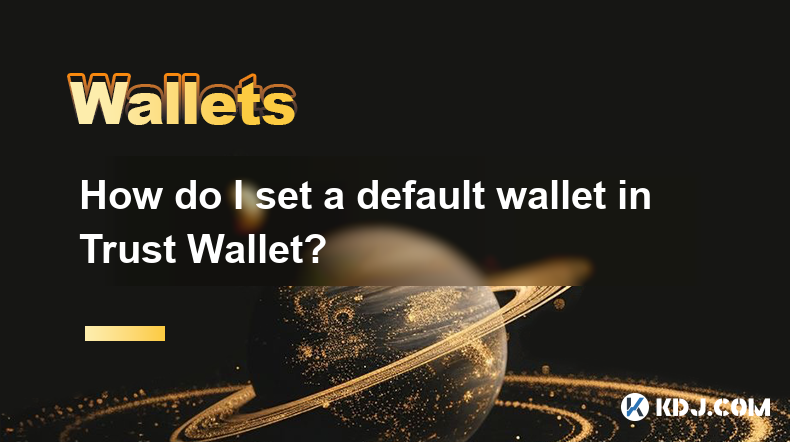
Trust Wallet doesn't operate with the concept of a single "default" wallet in the traditional sense. Instead, it manages multiple crypto wallets within a single app. Each cryptocurrency you add is essentially its own individual wallet, secured by its own unique seed phrase. Therefore, the idea of setting one as "default" doesn't directly apply. However, you can manage which wallet is most readily accessible.
Understanding Trust Wallet's Wallet Structure
Trust Wallet functions as a multi-currency wallet. This means you can store various cryptocurrencies, each in its own separate wallet address. When you add a new cryptocurrency, like Bitcoin or Ethereum, Trust Wallet generates a new address specifically for that coin. These addresses are independent and are not linked to each other beyond being housed within the same application. This is a key security feature, preventing the compromise of one cryptocurrency from affecting others. Your interactions with each coin are isolated within its respective wallet.
Accessing and Prioritizing Wallets
While you can't set a default wallet, you can easily access the wallet you need most frequently. The wallet you last used will often be prominently displayed on the app's home screen. However, to quickly locate a specific wallet, you can use the search function within the app. Simply type the name of the cryptocurrency (e.g., "Bitcoin," "Ethereum," or the token's ticker symbol like "BTC" or "ETH") into the search bar. This will bring up that specific wallet. The app's intuitive interface allows for quick navigation between different wallets.
Adding and Managing Crypto Wallets
Adding a new cryptocurrency to your Trust Wallet is straightforward.
- Open the Trust Wallet app.
- Go to the "Portfolio" section.
- Tap the "+" button or a similar icon indicating "Add Coin."
- Search for the cryptocurrency you want to add.
- Tap on the cryptocurrency.
- Trust Wallet will then generate a new address specifically for that coin. Remember to back up your seed phrase securely. This seed phrase is crucial for recovering your wallet if you lose access to your device.
Remember, each added coin represents a separate, independent wallet. You'll receive a unique address for each cryptocurrency.
Frequently Asked Questions
Q: If I delete the Trust Wallet app, will I lose my cryptocurrencies?
A: No, as long as you have securely backed up your seed phrases for each cryptocurrency wallet, you can restore your wallets by using the seed phrases to recreate them within a new Trust Wallet installation. Never share your seed phrase with anyone. It's the key to your crypto assets.
Q: Can I transfer cryptocurrencies between different wallets within Trust Wallet?
A: You can't directly transfer between wallets within Trust Wallet. Instead, you need to send the cryptocurrency from one wallet address to another. This involves initiating a transaction from the sending wallet address to the receiving wallet address.
Q: What if I forget my seed phrase?
A: If you forget your seed phrase, you will likely lose access to your cryptocurrencies. There is no recovery mechanism without the seed phrase. This underscores the importance of storing your seed phrase securely and safely, ideally in multiple offline locations.
Q: Is it safe to use Trust Wallet?
A: Trust Wallet is a popular and generally well-regarded wallet, but like any cryptocurrency wallet, it carries inherent risks. Security best practices, such as using strong passwords, enabling two-factor authentication (if available), and securely storing your seed phrases, are crucial for minimizing those risks.
Q: How do I update my Trust Wallet?
A: Keep your Trust Wallet app updated to the latest version. Updates often include security patches and improvements. Check your app store (Google Play or Apple App Store) for updates.
Q: Can I use Trust Wallet on multiple devices?
A: You can access your wallets on multiple devices using the same seed phrase. However, exercise caution and ensure the security of each device. Be mindful of potential phishing scams or malware.
Q: What happens if I lose my phone?
A: Losing your phone doesn't necessarily mean losing your crypto. Provided you've backed up your seed phrases, you can restore your wallets to a new device. However, consider reporting your lost phone to prevent unauthorized access.
Q: Can I use Trust Wallet for NFTs?
A: Yes, Trust Wallet supports certain NFTs. The availability depends on the blockchain and the NFT itself. Check the Trust Wallet app to see if it supports the specific NFT you're interested in.
Q: Is there a customer support team for Trust Wallet?
A: Trust Wallet offers customer support through various channels. Check their website or the app for contact information. Be wary of unofficial support channels.
Disclaimer:info@kdj.com
The information provided is not trading advice. kdj.com does not assume any responsibility for any investments made based on the information provided in this article. Cryptocurrencies are highly volatile and it is highly recommended that you invest with caution after thorough research!
If you believe that the content used on this website infringes your copyright, please contact us immediately (info@kdj.com) and we will delete it promptly.
- Meme Coins Have Evolved into Some of the Most Sought-After Investments
- 2025-04-02 01:25:12
- In the Dynamic Realm of Cryptocurrency Investments: The Ethereum (ETH) vs. XRP Dilemma
- 2025-04-02 01:25:12
- Monero (XMR) Loses Its Grip as Liquidity and Accessibility Challenges Drive Darknet Markets Back to Bitcoin (BTC)
- 2025-04-02 01:20:12
- Solana Meme Coins Hit the Headlines as FARTCOIN, MEW, and Ai16z Pump
- 2025-04-02 01:20:12
- Panshibi ($SHIBI) Could Be the Next Big Meme Coin, Outperforming Shiba Inu (SHIB) and Dogecoin (DOGE)
- 2025-04-02 01:15:12
- Despite Market Uncertainty, Dogecoin (DOGE) Appears to Be Struggling to Gain Momentum
- 2025-04-02 01:15:12
Related knowledge
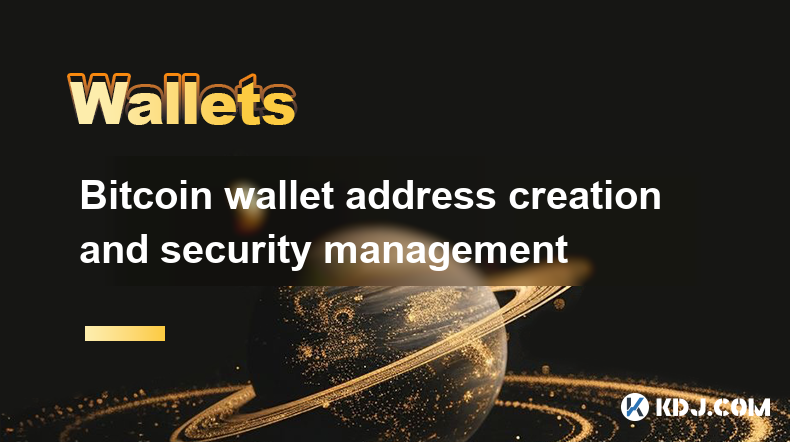
Bitcoin wallet address creation and security management
Mar 31,2025 at 10:56pm
Understanding Bitcoin Wallet AddressesA Bitcoin wallet doesn't store Bitcoin directly. Instead, it stores private keys which are long strings of characters. These keys grant access to your Bitcoin. Your public key, derived from the private key, is used to generate your Bitcoin wallet address, a unique identifier similar to a bank account number. This a...

How to easily generate a Bitcoin payment address
Mar 29,2025 at 10:49am
Generating a Bitcoin payment address might seem daunting, but it's actually quite straightforward. This process is crucial for receiving Bitcoin, as each transaction requires a unique address. Understanding how this works is fundamental to using Bitcoin effectively. This guide will walk you through the simple steps, regardless of your technical experti...
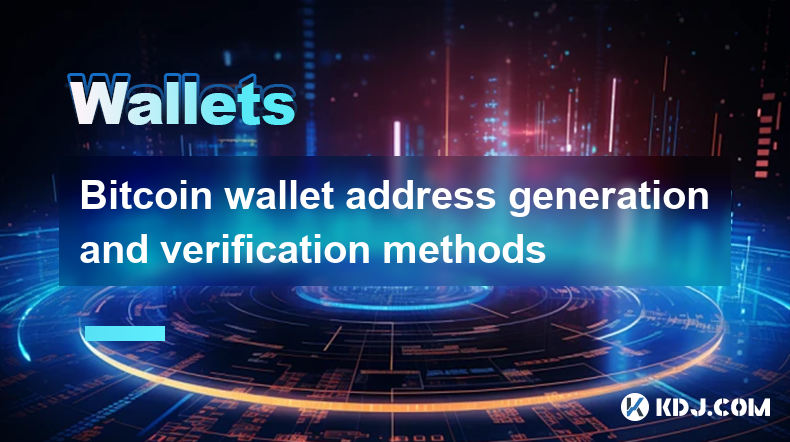
Bitcoin wallet address generation and verification methods
Apr 01,2025 at 11:01am
Understanding Bitcoin Wallet AddressesA Bitcoin wallet address is a unique identifier, similar to a bank account number, used to receive and send Bitcoin. It's a string of alphanumeric characters, crucial for participating in the Bitcoin network. Understanding how these addresses are generated and verified is paramount for secure Bitcoin transactions. ...
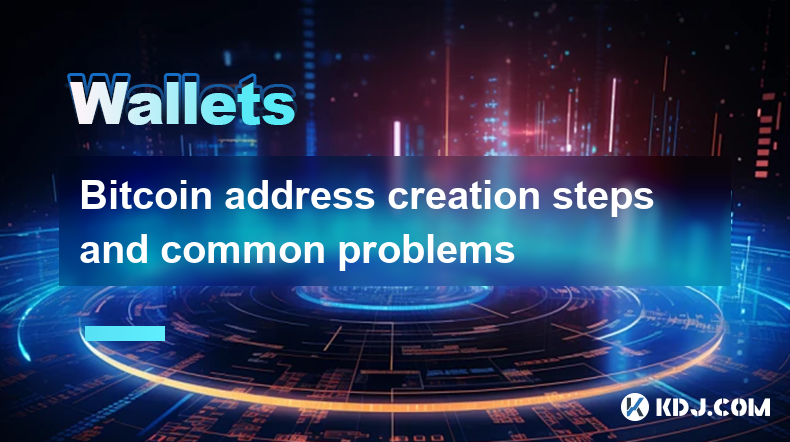
Bitcoin address creation steps and common problems
Mar 30,2025 at 06:07am
Understanding Bitcoin AddressesA Bitcoin address is a unique identifier, similar to a bank account number, used to receive Bitcoin. It's a string of alphanumeric characters generated from a public key, derived from your private key. Understanding the distinction between public and private keys is crucial for Bitcoin security. Your private key should be...
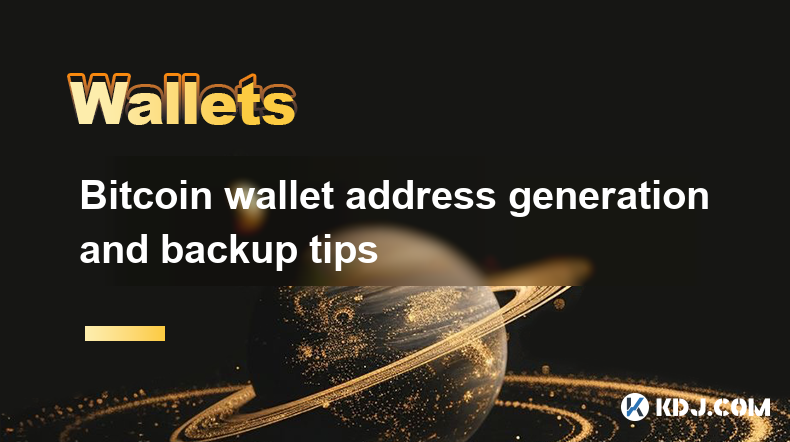
Bitcoin wallet address generation and backup tips
Apr 01,2025 at 05:00pm
Understanding Bitcoin Wallet AddressesA Bitcoin wallet address is essentially your unique identifier on the Bitcoin blockchain. It's a string of alphanumeric characters used to receive Bitcoin. Unlike bank accounts, you can have multiple addresses associated with a single wallet. These addresses are generated by your wallet software using cryptographic...
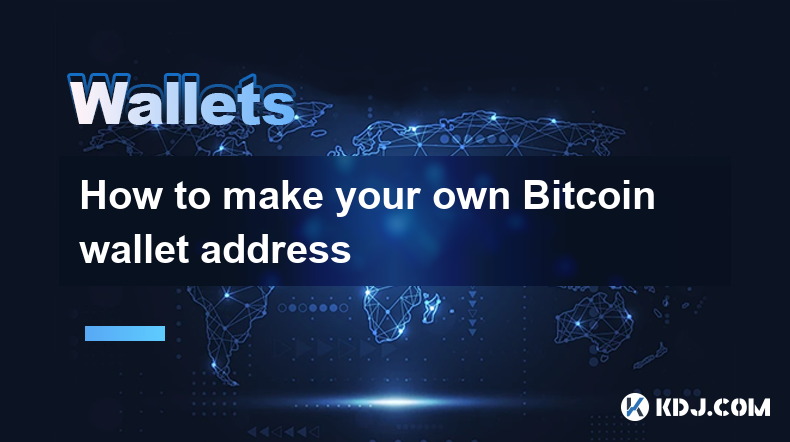
How to make your own Bitcoin wallet address
Mar 29,2025 at 08:42pm
Creating your own Bitcoin wallet address is crucial for securing and managing your Bitcoin holdings. It allows you to independently receive and send Bitcoin without relying on third-party services. This process involves understanding the different types of wallets and choosing the one that best suits your needs and technical expertise. Incorrectly gene...

Bitcoin wallet address creation and security management
Mar 31,2025 at 10:56pm
Understanding Bitcoin Wallet AddressesA Bitcoin wallet doesn't store Bitcoin directly. Instead, it stores private keys which are long strings of characters. These keys grant access to your Bitcoin. Your public key, derived from the private key, is used to generate your Bitcoin wallet address, a unique identifier similar to a bank account number. This a...

How to easily generate a Bitcoin payment address
Mar 29,2025 at 10:49am
Generating a Bitcoin payment address might seem daunting, but it's actually quite straightforward. This process is crucial for receiving Bitcoin, as each transaction requires a unique address. Understanding how this works is fundamental to using Bitcoin effectively. This guide will walk you through the simple steps, regardless of your technical experti...

Bitcoin wallet address generation and verification methods
Apr 01,2025 at 11:01am
Understanding Bitcoin Wallet AddressesA Bitcoin wallet address is a unique identifier, similar to a bank account number, used to receive and send Bitcoin. It's a string of alphanumeric characters, crucial for participating in the Bitcoin network. Understanding how these addresses are generated and verified is paramount for secure Bitcoin transactions. ...

Bitcoin address creation steps and common problems
Mar 30,2025 at 06:07am
Understanding Bitcoin AddressesA Bitcoin address is a unique identifier, similar to a bank account number, used to receive Bitcoin. It's a string of alphanumeric characters generated from a public key, derived from your private key. Understanding the distinction between public and private keys is crucial for Bitcoin security. Your private key should be...

Bitcoin wallet address generation and backup tips
Apr 01,2025 at 05:00pm
Understanding Bitcoin Wallet AddressesA Bitcoin wallet address is essentially your unique identifier on the Bitcoin blockchain. It's a string of alphanumeric characters used to receive Bitcoin. Unlike bank accounts, you can have multiple addresses associated with a single wallet. These addresses are generated by your wallet software using cryptographic...

How to make your own Bitcoin wallet address
Mar 29,2025 at 08:42pm
Creating your own Bitcoin wallet address is crucial for securing and managing your Bitcoin holdings. It allows you to independently receive and send Bitcoin without relying on third-party services. This process involves understanding the different types of wallets and choosing the one that best suits your needs and technical expertise. Incorrectly gene...
See all articles























































































